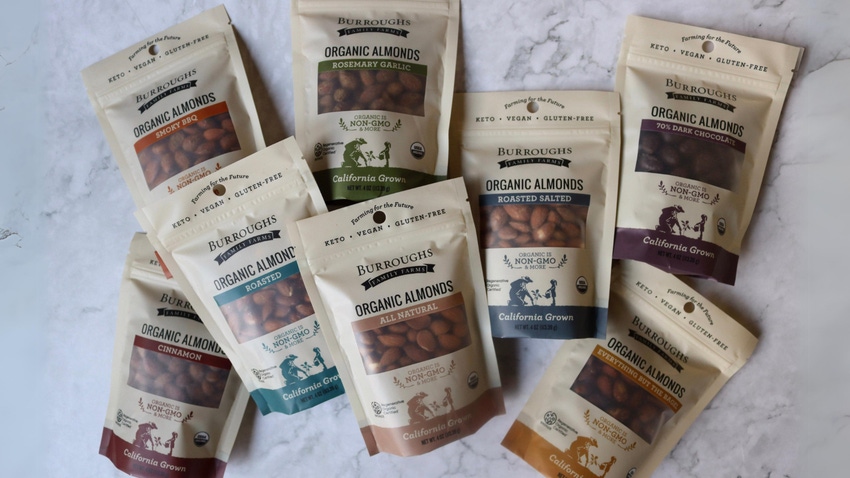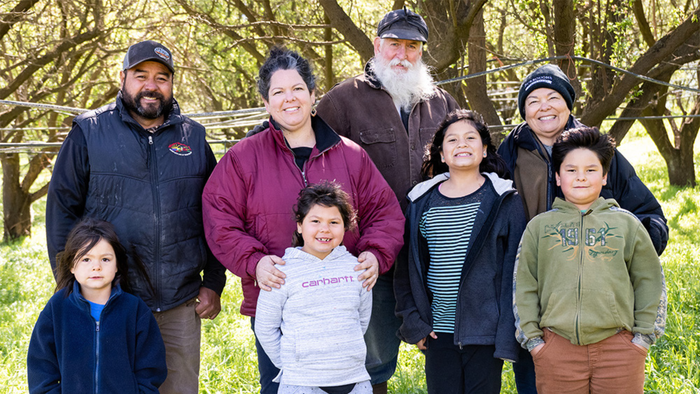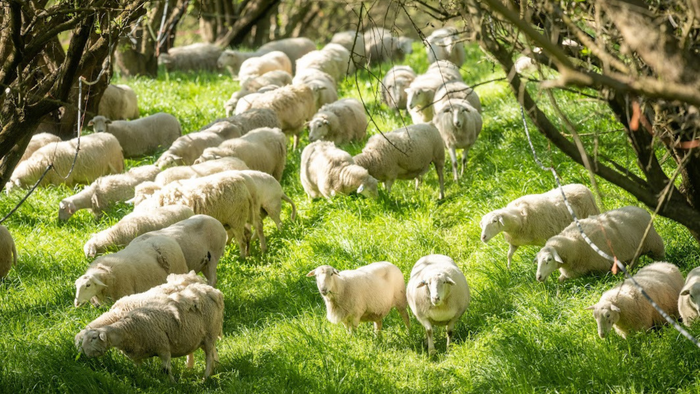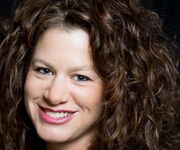Burroughs Family Farms pioneers ROC almond farming
The fifth-generation stewards of this California almond farm keep its livelihood sustainable through Regenerative Organic Certified practices. Learn more.
February 20, 2024

Natural Products Expo West’s Fresh Ideas Organic Marketplace is a one-day-only, farmers market-type event. New Hope Network spotlights a few of these brands to give buyers a taste of what they can find.
Thirsty almonds have long gotten a bad rap, especially in drought-prone California, where the nuts are the state’s highest-grossing crop. One grower, however, is proving there’s a better, more water-savvy, sustainable way to do it: regeneratively. Burroughs Family Farms was the first Regenerative Organic Certified almond farm in the country, according to the Regenerative Organic Alliance database.
Farmed by the fifth generation of the Burroughs family, the 650-acre operation in the San Joaquin Valley near Yosemite National Park became certified organic in 2015.
“After learning about the incredible impacts regenerative farming practices have on the farm ecosystem, like saving water, using less resources and bringing more revenue to the farm, we jumped on board,” says Benina Burroughs Montes, managing partner at Burroughs Family Orchards, which is a partnership with her parents, Ward and Rosie Burroughs. The Regenerative Organic Alliance certified the farm in June 2022 at the Bronze level.
“The ROC seal lets us share our story of commitment to the planet, and as our soils get healthier, our products will also be more nutrient dense, leading to the highest quality products for our customers,” Montes says.
The family’s mission is to take what they’ve learned from 130 years of farming and “farm for the future.”
“Farming for us is about working with nature to enhance the soil biology and manage the resources of plants and animals to ensure the highest and best use of land for all life,” Montes says.
Burroughs Family Farm is a Natural Products Expo West NEXTY Awards finalist. Attend the awards ceremony at 6 p.m. PDT Thursday, March 14, at Marquis Ballroom Center in the Marriott or watch it online.
The almond orchards are part of the broader Burroughs Family Farms, which produces beef, chickens, eggs, seasonal meats, olive oil, sheep and walnuts. It sells packaged raw and flavored almonds and nut butters and also provides almonds to manufacturers such as New Barn Organics for its Regenerative Organic Certified almond milks.
Ecdysis Foundation used the farm as part of its research comparing regenerative to conventional farms, which led to the published study, Regenerative Almond Production Systems Improve Soil Health, Biodiversity, and Profit. “The highlights from this study showed that, collectively, the regenerative farms infiltrated water six times faster and could hold more water,” says Montes.
Montes grew up on the farm and knew since sixth grade that she wanted to spend her life growing food on her family’s land. After earning a degree in ag business at Cal Poly, she returned and dug in. She and husband Heriberto have four children—Mariana, 13, Ward, 11, Juliana, 9, and Rosie, 7—who love helping on the farm, from snapping pictures for social media to caring for the sheep that graze the orchards.

The Burroughs family continues to operate the farm and almond orchard. Back row, from left, Heriberto Montes, Benina Burroughs Montes, and Ward and Rosie Burroughs. The Montes children, in the front row, are very involved in the farm, as well.
As you learned more about regenerative agriculture, what surprised or excited you most?
Benina Burroughs Montes: What surprised me the most was how simple the principles are, yet what an impact they can have on our world. What excited me was the opportunities for diversity and bringing more life to our farm. Seeing our sheep graze in lush, green cover crops in the spring is a sight of beauty.
What was the most challenging change to make to achieve Regenerative Organic certification?
BBM: For us, we did not find it challenging. We have been on a journey, and it has just been part of our process. There is lots of paperwork, though.
Strolling through your almond orchard, what would I notice that’s different from a conventional or organic orchard?
BBM: You would notice, with all of your senses, the abundance of life and positive energy. Our orchards are alive. You will see more birds, beneficials and vegetative cover. You will hear birds chirping and beneficials buzzing. When you walk on the farm, you can experience the structure of the soil aggregates, which create a spongy feeling. Ecdysis research has shown there are three times the birds, more water-holding capacity and a sixfold increase in invertebrates in the top inch of soil [on] regenerative farms versus conventional.
How are regenerative ag principles particularly suited for almond growing? How does organic agriculture address the well-known issues with almond growing, such as water footprint?
BBM: Most almonds are already managed under minimum to no till. One of the biggest challenges for regenerative almond farmers is managing cover crops during bloom and frost seasons. We have invested in a catch-frame harvest system, which enables us to leave more ground cover protections on our orchard floors and will improve the air quality. Regenerative practices improve all ecosystems, including the water cycle. Regenerative almond orchards are not only producing nuts but are part of the Earth’s water cycle, nutrient cycle and carbon cycle. When soil health is the priority, all of these positive impacts follow.

Could you explain how a few specific regenerative practices are beneficial to your orchards?
BBM: By keeping the ground covered, we are keeping the soil alive. The roots help with water penetration, [and] the groundcover and its root system lower soil temperature in our summer, which supports soil biology and creates pathways for rain and irrigation water to penetrate into the soil profile during the rainy season. The hedgerows support habitat for many beneficials, including millions of native insects and birds to protect and pollinate our orchards. Through planned grazing, there is a notable improvement in nutrients, carbon and water cycles. This method enhances soil organic matter (carbon), promotes a thriving soil biology with increased microbial activity and contributes significantly to overall soil health. By carefully managing grazing patterns, we harness these benefits, creating a more sustainable and resilient ecosystem that positively impacts the environment and agricultural productivity.
Why employ whole-orchard recycling (WOR)?
BBM: WOR is an innovative and sustainable practice that contributes to the success of the subsequent orchard by not only putting everything grown in the previous orchard to optimal use, achieving zero waste, but also providing value back to the grower by delivering nutrients, improving soil quality and, ultimately, potentially increasing yields.
How have other almond growers responded to your Regenerative Organic certification? Do you think other growers might follow suit?
BBM: There is interest, especially as resources are more scarce—namely water.
What do you think prevents more growers from converting to regenerative? What have been your most successful selling points in convincing them?
BBM: I think growers are constricted by the “way things are done.” We continue to share the benefits of regenerative almond farming. In fact, we host a field day each year on our farm to show other farmers the possibilities.
What are your goals for Natural Products Expo West?
BBM: Bring awareness and education and sell our Regenerative Organic Certified, California-grown, nutrient-dense almond products.
 Burroughs Family Farms will exhibit in Booth F69 at the Fresh Ideas Organic Marketplace from 11 a.m. to 4 p.m. Wednesday, March 13, in the white tent near the Marriott.
Burroughs Family Farms will exhibit in Booth F69 at the Fresh Ideas Organic Marketplace from 11 a.m. to 4 p.m. Wednesday, March 13, in the white tent near the Marriott.
Visit the website for more information about Natural Products Expo West or registration information.
About the Author(s)
You May Also Like




